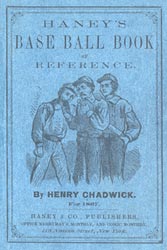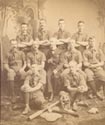 |
|
| |
|||||||
|
|||||||
|
|||||||
MORE: How Baseball Became The National Pastime |
|
 Trade catalog, “Black band” Spalding bat |
On July 14, 1867, The Detroit
Free Press carried an announcement of the tournament, which was held
at the grounds of the Detroit Base Ball Club from August 14th to August
21st. The international tournament attracted teams from Michigan, Pennsylvania,
and Ontario. When Detroit hosted the World’s Tournament in 1867,
it announced it would abide by the rules as published in Henry Chadwick’s
book, Haney’s Base Ball Players Book of Reference. Chadwick,
along with Albert G. Spalding, were the two individuals who helped baseball
achieve national prominence. Chadwick, a New York sportswriter, immigrated to the United States from England as a boy. He reported on baseball games, and created a system for scoring games that continues to appear in sports pages today as the box score. Chadwick also authored a number of instructional books on how to play the “national game.” Books, such as Chadwick’s, helped create a uniform game, and promote baseball as acceptable recreation for men, and appropriate for men, women, and children to watch. Chadwick also authored the annual publication, Spalding’s Official Base Ball Guide, until his death in 1908. |
In the
early 20th century, Spalding and Chadwick put forth different versions
of the origins of the game of baseball. Chadwick had long asserted that
baseball developed based on British bat and ball games, such as “rounder."
In an era of American nationalism, Albert Spalding hoped to find an
American source for the game. He cajoled professional baseball to appoint
a commission in 1905 to investigate the origins of the game. Chaired
by A.G. Mills, the commission received a letter from a Denver, Colorado
engineer by the name of Abner Graves asserting that he was present when
Abner Doubleday developed the game in Cooperstown, New York in 1839.
Chadwick responded with evidence detailing the history of English bat
and ball games without avail. Spalding’s zeal to establish baseball
as a purely American game, and his connections within the commission,
compelled the group to recognize the circumstantial evidence and acknowledge
Doubleday as baseball’s founder. |
|
|
|
| Copyright © The Henry Ford ~ http://www.TheHenryFord.org |



